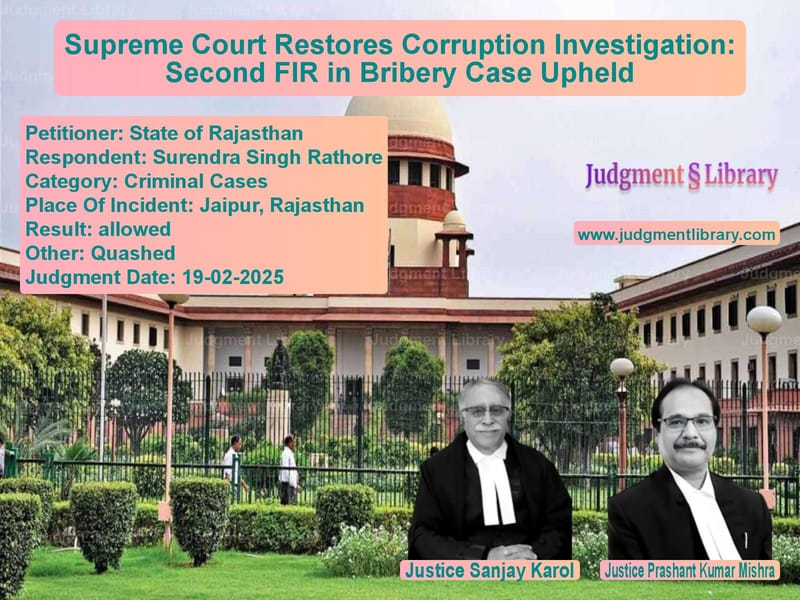Supreme Court Restores Corruption Investigation: Second FIR in Bribery Case Upheld
The Supreme Court recently ruled in the case of State of Rajasthan vs. Surendra Singh Rathore, addressing the legal permissibility of filing a second FIR in a corruption case. The ruling clarifies whether multiple FIRs can be registered for related but distinct aspects of an alleged crime, particularly when new evidence surfaces.
Background of the Case
The case originates from a corruption scandal involving Surendra Singh Rathore, who was employed as the Chief Executive Officer-cum-Project Director, Bio-fuel Authority, Government of Rajasthan. The Anti-Corruption Bureau (ACB) of Rajasthan registered two FIRs against him for allegedly demanding bribes for granting bio-diesel licenses.
The timeline of events:
- April 4, 2022: The accused allegedly demanded a bribe of Rs. 15 lakhs per month and Rs. 5 lakhs for license renewal.
- April 7, 2022: He was caught accepting a bribe in a trap laid by ACB.
- April 14, 2022: A second FIR was registered based on surveillance recordings and additional evidence revealing a larger bribery network.
- September 9, 2022: The Rajasthan High Court quashed the second FIR.
- February 19, 2025: The Supreme Court overturned the High Court ruling and restored the second FIR.
Petitioner’s Arguments (State of Rajasthan)
The State of Rajasthan contended that:
- The second FIR was based on newly discovered evidence involving multiple accused persons.
- The first FIR focused on a specific bribery incident, while the second FIR uncovered a larger conspiracy spanning months.
- The High Court erred in quashing the second FIR since it was not based on the same facts as the first FIR.
The petitioner’s counsel argued:
“Quashing the second FIR would prevent a full investigation into systemic corruption. The new evidence justifies a separate case.”
Respondent’s Arguments (Surendra Singh Rathore)
The respondent argued:
- The second FIR was illegal as it covered the same transaction as the first FIR.
- According to the Supreme Court’s ruling in T.T. Antony v. State of Kerala (2001), a second FIR is impermissible unless it pertains to a counter-case.
- The Anti-Corruption Bureau could have conducted a further investigation instead of filing a new FIR.
- Proceeding without prior sanction from the government violated the Prevention of Corruption Act.
The respondent’s counsel argued:
“Registering a second FIR for the same allegations is an abuse of process. The state could have expanded its investigation under the original FIR.”
Supreme Court’s Observations
The Supreme Court analyzed whether the two FIRs were distinct or if they were part of the same incident. Key observations included:
- A second FIR is permissible when new facts emerge that reveal a larger conspiracy.
- The first FIR was specific to one bribery transaction, whereas the second FIR uncovered a widespread corrupt network.
- There was no double jeopardy since the two FIRs addressed different aspects of the crime.
- Requiring permission before investigating corruption cases would hinder law enforcement.
The Court ruled:
“Quashing the second FIR would nip the investigation into systemic corruption in the bud. The same would be against the interest of society.”
Final Judgment
The Supreme Court:
- Set aside the High Court’s ruling.
- Restored the second FIR (No. 131 of 2022).
- Directed the Rajasthan Police to complete the investigation without delay.
The Court concluded:
“Where corruption is systemic, law enforcement agencies must be allowed to investigate every aspect. Preventing a full inquiry through procedural objections is against public interest.”
Conclusion
This ruling clarifies the conditions under which multiple FIRs can be filed in corruption cases:
- A second FIR is allowed if it reveals a larger criminal network.
- Investigators are not restricted to a single FIR if new evidence exposes additional offenses.
- Law enforcement must be given the freedom to pursue corruption cases to their logical end.
The Supreme Court’s decision ensures that bribery cases are fully investigated and that public officials are held accountable under the law.
Petitioner Name: State of Rajasthan.Respondent Name: Surendra Singh Rathore.Judgment By: Justice Sanjay Karol, Justice Prashant Kumar Mishra.Place Of Incident: Jaipur, Rajasthan.Judgment Date: 19-02-2025.
Don’t miss out on the full details! Download the complete judgment in PDF format below and gain valuable insights instantly!
Download Judgment: state-of-rajasthan-vs-surendra-singh-ratho-supreme-court-of-india-judgment-dated-19-02-2025.pdf
Directly Download Judgment: Directly download this Judgment
See all petitions in Fraud and Forgery
See all petitions in Money Laundering Cases
See all petitions in Custodial Deaths and Police Misconduct
See all petitions in Judgment by Sanjay Karol
See all petitions in Judgment by Prashant Kumar Mishra
See all petitions in allowed
See all petitions in Quashed
See all petitions in supreme court of India judgments February 2025
See all petitions in 2025 judgments
See all posts in Criminal Cases Category
See all allowed petitions in Criminal Cases Category
See all Dismissed petitions in Criminal Cases Category
See all partially allowed petitions in Criminal Cases Category







